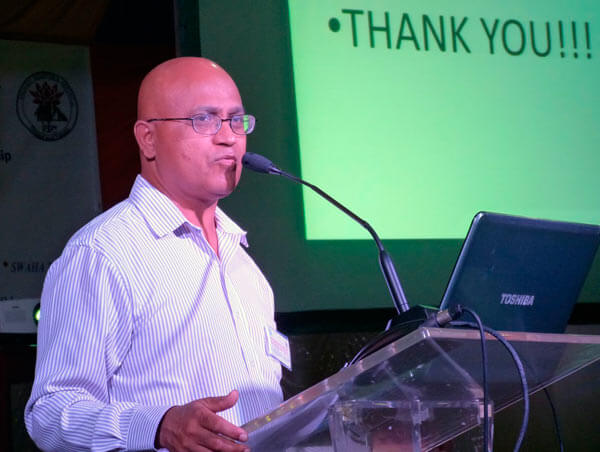Every year since 1985, the emancipation of enslaved Africans is celebrated in Trinidad and Tobago on Aug. 1 which has been declared a national holiday.
Slavery and indentureship were among the most heinous and inhumane crimes committed against African and Indian peoples in the diaspora. Slavery was similar to indentureship in more ways than one.
In fact there is a book on indentureship entitled, “A New System of Slavery: The Export of Indian Labour Overseas (1830-1920)”. In this seminal and comprehensive book, Professor Hugh Tinker gave details of the many similarities that two systems shared in common.
A research paper entitled “Cheaper than a slave: Indentured labor, colonialism and capitalism” also makes interesting reading. It was written by Dr. Tayyab Mahmud, a professor of law and director of the Center for Global Justice at Seattle University.
As an epigraph, Mahmud quoted a passage from Amitav Ghosh’s Sea of Poppies (2008): “‘Do you mean slaves, sir?’ Mr. Burnham winced. ‘Why no, Reid. Not slaves – coolies. Have you not heard it said that when God closes one door he opens another? When the doors of freedom were closed to the African, the Lord opened them to a tribe that was yet more needful of it – the Asiatick.’”
On page 15 of his research paper on indentureship, Mahmud wrote: “The main successor to modern slavery was the institution of indentured labor, which is often portrayed as a bridge between slavery and modern forms of contract labor. This switch in the form of labor also involved a switch in the source of the labor supply from Africa to Asia.”
African leaders and historians have been given recognition and support by CARICOM governments. In 2013, CARICOM established a reparations commission (CRC) to pursue the path to reconciliation, truth and justice for the victims of slavery and their descendants. CARICOM funds this body which has a chairman and several members — all of whom are compensated and are receiving stipends for their work and travel.
Indian community leaders and scholars feel that there should also be reparatory justice for the descendants of the victims of indentureship as well as the genocide of the indigenous peoples of the New World. They also believe that Chinese, Madeirans and Portuguese should also be part of the CARICOM Reparations Commission. African leaders and CARICOM governments cannot agitate for compensation for only Blacks in the Caribbean.
Paradoxically, CARICOM is violating the very concept of fairness, equity and justice by excluding non-Africans in the Commission. There is not a single Indian or Chinese or Madeiran or Portuguese or indigenous Indian in the CARICOM Reparations Commission. The Chairman is Prof. Sir Hilary Beckles from UWI, Mona Campus.
Barbados is represented by Prof. Pedro Welch, Dominica is represented by Dr. Damien Dublin, Antigua and Barbuda by Mr. Dorbrene O’Marde, Nasau by Mr. Alfred M. Sears and Mr. Phillip P. Smith, Guyana by Mr. Eric Phillip, Jamaica by Prof. Verene Shepherd and Ms. Laleta Davis Mattis, St. Kitts and Nevis by Ras Dabo Penny, St. Vincent and the Grenadines by Senator Jomo Thomas and Mr. Curtis King, Suriname by Mr. Armand Zunder, St. Lucia by Mr. Earl Bousquet and Trinidad & Tobago by Mr. Aiyegoto Ome.
After consultation with stakeholders, I would like to recommend the following persons be included in the CARICOM Reparations Commission: Suriname should be represented by Professor Maurits Hassankhan and Dr. Narinder Mohkamsingh, Guyana by Dr. Vishnu Bisram, Ms. Ryhaan Shah and Mr. Ravi-dev, Trinidad by Dr. Kumar Mahabir and Mr. Kamal Persad, St. Vincent and the Grenadines by Dr. Arnold Thomas, Grenada by Mr. Jai Sears, Jamaica by Dr. Winston Tolan, and Belize by Ms. Sylvia Gilharry-Perez.
There should be compensation to the descendants of Indian indentured for crimes committed against their forebears who were duped into leaving India, underpaid and cheated for their labour, jailed and beaten wrongfully, and robbed of the land that they were promised.
There is a compelling argument for reparations for Indians in the book entitled “Sat Maharaj: Hindu Civil Rights Leader of Trinidad and Tobago” by biographer Dr. Kumar Mahabir.
On page 147, Mahabir wrote: “During the hundred-year period of 1845 to 1945, all marriages not performed by the Christian church or at a warden’s office were not legally recognised by the State. Thus, widows and children of Hindu and Muslim land owners were unable to claim their relative’s estates after they had died. Children of Hindu and Muslim marriages were considered to be illegitimate and thus the land that they should have inherited was given over, once again, to the State.”
Dr. Vishnu Bisram is an electoral pollster and political analyst.























